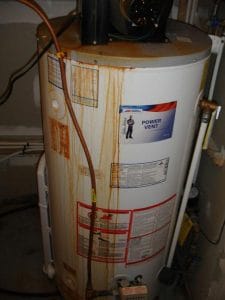Water heaters are critical but quite delicate plumbing devices. The hot water heater caters for all our hot water needs. It ensures that we have enough hot water to drink, cook, clean, and bathe. In return, this device requires special care and maintenance. This is not to say that the water heater requires constant care and maintenance. It means that you have to set aside some time every year to take care of this important plumbing device. Otherwise your water heater will develop all kinds of problems and you will incur very high expenses in plumbing repairs. Most water heater problems require the services of a professional DC water heater plumber. If your water heater is leaking, you can try to inspect it to find the source of the leak. But you will still have to hire a qualified plumber to fix the problem. There are many other very serious water heater problems that require the services of a professional plumber. The good news is that you can prevent some of these serious water heater problems. Today you are going to learn how to prevent two serious water heater issues: clogging and corrosion.
Regular And Proper Flushing
Let us start by looking at the problem of clogging in your water heater. The water that flows into your water heater might contain some sediments and impurities. These sediments are usually in very minute quantities and hence you might not notice them when consuming the water. But these sediments collect inside your water heater over time. The problem of sediment buildup usually affects storage tank water heaters. The sediments in the water usually settle at the bottom of the hot water tank. If the hot water tank is not flushed or cleaned for a very long time, these sediments build up and clog the water heater, and possibly require emergency plumbing service. They will clog the drainage valve and affect the performance of your hot water heater. They can also cause the hot water to start tasting rusty. To prevent clogging in your water heater, flush the tank thoroughly every year. Flushing a water heater is quite easy and you do not need to call a plumber for this. Just switch the device off and attach a hose to the drainage valve. Run the hose to a sink or floor drain and then turn the drainage valve on to allow all the hot water to drain. Then let the cold water to continue running to remove all the sediments.
Use A Water Softener
The other serious problem in water heaters is corrosion. The hot water tank is made of steel, which means that it’s susceptible to corrosion. The tank is corroded by mineral deposits like calcium, which are found in hard water. You can solve this problem by adding a water softener to your water supply system. This will get rid of all those minerals in the water and keep your water heater safe.
Replace The Anode Rod Regularly
A water softener will try to eliminate all the minerals in the hard water but some might still slip through. That is why storage tank water heaters come with an anode rod. The anode rod is placed inside the hot water tank to attract all corrosive elements that can corrode the tank. Inspect the anode rod regularly and replace it every 2-3 years to prevent water heater corrosion.




